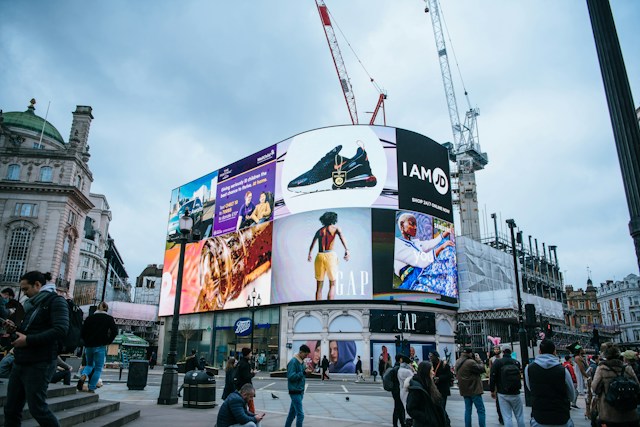
Top DTC Brands Shaping the Future of Ecommerce
06 Feb, 20245 minDTC brands have revolutionised the traditional retail landscape, leveraging digital strategi...

DTC brands have revolutionised the traditional retail landscape, leveraging digital strategies to forge direct connections with customers. These brands have been influential in changing the face of modern marketing, offering unique products, personalised experiences, and streamlined purchasing processes. However, among the growing number of DTC brands, a few companies have emerged as leading lights in the world of direct-to-consumer commerce.
In this blog, we'll explore some of the top DTC brands that are reshaping e-commerce and setting new standards for customer engagement, creativity, and success. We’ll take a look at each company’s backstory, their unique characteristics, and examples of the marketing strategies that have cemented their accomplished reputations. We hope these innovative examples will inspire you to develop your own cutting-edge marketing strategy.
5 Brands Leading the DTC Marketing Space
The ecommerce sector has seen an influx of DTC brands in recent years, a trend that has significantly reshaped digital marketing. Given the various advantages the direct-to-consumer model offers brands, such as greater control over branding and the ability to sell products directly to end customers, it’s unsurprising that so many businesses have entered the DTC scene.
And it's not just businesses that are jumping on the DTC trend - figures show that the preference for buying direct has increased from 5% of customers to 27% in 2023. This notable rise indicates that customers are learning to appreciate the various consumer-side benefits of DTC ecommerce, from more personalised shopping experiences to access to exclusive products. As of 2023, approximately 13% of all ecommerce businesses have adopted the DTC model, and this number is set to grow considerably as DTC ecommerce sales continue to rise.
So, amid the increasingly competitive DTC market, which brands have been able to remain at the forefront of this era-defining ecommerce trend?
Below, we’ll explore 5 DTC brands that are making a profound impact on the future of e-commerce:
1. ASOS
As one of the world’s most recognisable DTC brands, ASOS is an online fashion and beauty retailer predominantly serving young adults looking for on-trend clothing, beauty products, and fashion accessories. Founded in 2000, ASOS has earned itself an esteemed reputation for becoming a leading online fashion destination with an extensive product range. Indeed, the company’s ability to adapt to changing fashion and technological trends has contributed to its sustained success.
ASOS’ success can largely be attributed to its digital and social media savvy. With a strong online presence, this brand excels in utilising social media channels for marketing, customer interaction, and showcasing their distinctive products. They also emphasise the importance of providing an elevated customer experience, offering flexible return policies and facilitating swift delivery processes.
Case Study: The AySauce Challenge
A prime example of ASOS’ marketing excellence is the ‘AySauce Challenge’. Running for a three-week period in 2020, this innovative campaign involved more than 25 leading content creators with a combined following of more than 219 million people.
Those who participated were asked to flaunt three of their favourite outfits within 15 seconds on TikTok and encouraged to use their creativity to bring their unique looks to life.
Designed to target ASOS' audience of twenty-something fashion lovers, the challenge aimed to raise brand awareness and boost engagement levels. Notably, it featured a bespoke music track and an interactive augmented reality experience with TikTok's branded effects. This campaign effectively leveraged a number of cutting-edge DTC marketing techniques, such as social media engagement, influencer collaborations, and user-generated content.
3. Gymshark
Gymshark is another DTC brand that has made waves in the digital marketing industry. Though now one of the UK’s eminent fitness apparel companies, Gymshark had relatively humble beginnings. Starting out as a small venture operating out of CEO Ben Francis’ garage in 2012, Gymshark soon gained significant attention from fitness enthusiasts, not least due to their emphasis on cutting-edge designs and the use of high-quality materials.
Gymshark’s early adoption of the direct-to-consumer model helped them to achieve rapid success, allowing them to establish a direct relationship with their customers, offer competitive pricing without involving third-party retailers, and gather valuable data-driven insights. They’ve invested significant time and resources into building a community around its brand by engaging with their audience via social media platforms like Instagram and YouTube.
With a community-driven approach and a mastery of the DTC consumer, it is probably no surprise that Gymshark have reached such heights. Their brand identity has become synonymous with innovation, community engagement, and the direct-to-consumer approach, and their successes show no sign of slowing down any time soon.
Case Study: United We Sweat
Gymshark’s ‘United We Sweat’ is a particularly creative marketing campaign that aims to celebrate diversity and inclusion among the fitness community. Launched in 2022, this initiative’s overarching goal is to spread the message that fitness connects us all despite our differences. The campaign utilised effective influencer partnerships with a variety of athletes from diverse backgrounds, including UFC heavyweight champion Francis Ngannou, American football player George Bamfo, and professional swimmer Haven Shepard.
Gymshark used social media channels like Instagram, TikTok, and Snapchat to spread this important message, helping promote a supportive fitness culture. The campaign has earned significant acclaim for its aspirational nature and relatability, resonating with people throughout the fitness enthusiast community.
If you have decided that adopting the DTC marketing model is right for your business, we urge you to read our ‘A Guide to Developing a DTC Marketing Strategy’ guide. In this piece, we explore 5 of the most effective methods you should implement to develop a successful direct-to-consumer marketing strategy.
3. Wayfair
If you’ve ever had to buy a piece of furniture online, chances are that you’ve stumbled across home goods and furnishings supplier Wayfair. With a rich history dating back to 2002, this company set out to revolutionise the way consumers shop for home furniture and decor, offering a vast product selection and seamless, convenient online shopping experiences. The brand received a welcome sales boost during the Covid-19 pandemic when customers turned to online shopping for their furniture and homeware.
Wayfair has achieved success as a DTC brand in numerous ways. As an online retailer, the company has invested heavily in its ecommerce platform, thus ensuring aesthetically appealing product displays and a user-friendly interface. In addition to facilitating straightforward shopping experiences, the brand leverages state-of-the-art technology to provide personalised info for their customers, manages an efficient logistics network, and employs creative marketing strategies to boost brand awareness.
Case Study: No Place Like It
Wayfair’s inventive ‘No Place Like It’ campaign aims to showcase the brand’s dedication to helping customers bring their ideal home aesthetics to life. Designed to focus on showcasing the company’s vast range of products, the initiative has been featured via a range of channels, including TV, social media, and emails. It skillfully used real customers, honest reviews, and products to hammer home the message that Wayfair is the number one spot for purchasing home furniture and accessories.
4. Farfetch
Through its effective use of the DTC marketing model, Farfetch has become one of the luxury fashion and retail industry’s most recognisable brands. Formed in 2007, the business aspires to be the first port of call for customers seeking luxury fashion items from top boutiques and brands worldwide. Today, Farfetch boasts a reputation for being one of the most successful DTC brands in the ecommerce space, seamlessly connecting customers with high-end fashion products.
One of Farfetch’s greatest strengths lies in its commitment to customer satisfaction. They have earned a solid reputation for their customer retention and loyalty, providing popular, user-friendly offerings like personalised shopping experiences and flexible return policies. Their omnichannel strategy has been particularly effective, having formed relationships with traditional luxury retailers to offer customers the option of buying their luxury clothing in-store.
With greater control over the way they operate, Farfetch have devoted significant financial resources to technology and ecommerce innovations. They have incorporated cutting-edge features into their platform, such as augmented reality and AI-driven recommendations, both of which greatly enhance customer engagement.
Case Study: The Perfect Match
The "Perfect Match" campaign focused on the idea of personalised shopping experiences and finding the ideal fashion pieces that perfectly suit each customer's style, taste, and personality. Farfetch used state-of-the-art technology and data-driven insights to recommend personalised fashion choices to its users, creating a sense of exclusivity.
This campaign involved various marketing channels, including online advertising, social media promotions, email marketing, and collaborations with influencers or fashion icons to showcase how customers could discover their "Perfect Match" in terms of fashion items available on Farfetch's platform.
5. AllSaints
Last on our list is AllSaints, a fashion brand renowned for its edgy, modern clothing. The AllSaints story began back in 1994 when founders Stuart Trevor and Kait Bolongaro decided to start up a menswear brand. The brand has expanded to include womenswear and other products since then, and owing to its unique aesthetic, extensive product range, and global presence, it has reached the pinnacle of online fashion retail.
So, how has this British DTC brand become such an influential player in ecommerce? One of their key strategies has been to strengthen their employer branding. With a distinctive brand identity centred around contemporary fashion, AllSaints has been able to stand out in the increasingly competitive fashion market. The business maintains a strong online presence across their social media channels, making it easy to engage with their customer base and facilitate memorable, convenient shopping experiences.
Case Study: #ItsUpToYou
Aiming to promote a sense of personal identity and creativity, AllSaints’ ‘It’s Up To You’ campaign is a global initiative that encourages customers to share the way they style the brand's collection by uploading photos on social media using the hashtag #ItsUpToYou. Under the catchy tagline “uniform without uniformity”, the campaign features local skateboarders, artists, musicians, and creatives, emphasising the brand's commitment to providing a platform for individual expression.
Key Takeaways From Top DTC Brands Shaping the Future of Ecommerce
Direct-to-consumer brands have reinvented the online retail sector, reshaping consumer interactions and setting new benchmarks for marketing strategies. Through personalised experiences, innovative products, and streamlined purchasing processes, these brands have not only captured market attention but also transformed customer expectations.
This guide delved into the stories of five leading DTC brands, showcasing their distinct paths to success and highlighting their groundbreaking marketing campaigns. From ASOS' AySauce Challenge leveraging influencer collaborations and user-generated content to Gymshark's community-driven approach through social media engagement, these case studies epitomise the innovative strategies propelling these brands to the forefront of the DTC trend.
Whether you are considering making the shift to the DTC model or a seasoned DTC marketer, the case studies we’ve discussed in this guide should offer inspiration for your next marketing campaign. These trailblazing DTC brands demonstrate that embracing innovation and a customer-centric approach are key when it comes to guaranteeing sustained success in DTC e-commerce.
Do You Need Expert Digital Recruitment Support?
As an award-winning digital recruitment agency, we take pride in helping our clients recruit the best and brightest ecommerce professionals. Serving job-seekers and businesses throughout the UK, Europe, and North America, our team have been delivering outstanding recruitment services for many years. Guided by your preferences, we’ll go above and beyond to match you with high-quality professionals with the skills to drive success at your organisation.
Contact us today to discover more about the market-leading digital recruitment services we offer.



